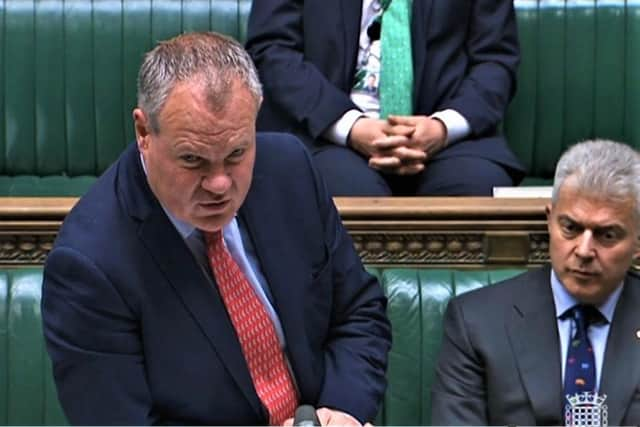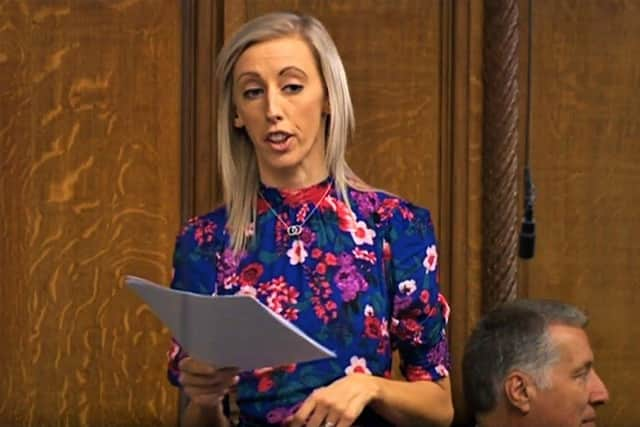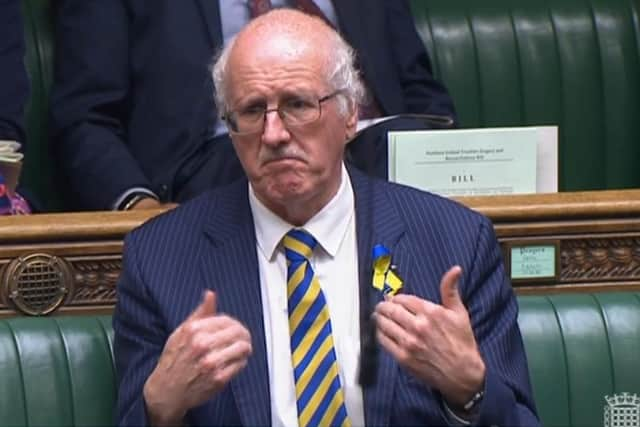Northern Ireland Troubles amnesty bill: Tory government gets four-and-a-half-hour battering from DUP to SNP over its plan to end punishments for murderers between 1966 and 1998
and live on Freeview channel 276
Conor Burns, the Belfast-born Tory who is now a minister in the Northern Ireland Office, endured hours of grilling over the proposals, with attacks coming from all sides but with the DUP largely leading the charge.
In simple terms, the proposed law – formally known as ‘The Northern Ireland Troubles (Legacy and Reconciliation) Bill’ – would end the prosecution of serious Troubles offences committed between January 1, 1966 and April 10, 1998.
Advertisement
Hide AdAdvertisement
Hide AdThis would apply to offences which led to death or made someone “suffer serious physical or mental harm”.


The government instead wants all such investigations to be carried out by a new body called the Independent Commission for Reconciliation and Information Recovery (ICRIR).
The idea is for perpetrators to come forward, give an account of how and why they committed their crimes to the ICRIR, and then walk away in the knowledge that the evidence they gave cannot be used against them.
By shunting all responsibility for the past on to the ICRIR it would mean “that police forces can get on with day to day policing and the police ombudsman can focus their resources on current policing issues,” the government says.
Advertisement
Hide AdAdvertisement
Hide AdOne of the first to rise and rubbish the plans was DUP MP Jim Shannon.


He cited a string of murders, including of his cousin Kenneth Smyth (shot dead by the IRA in 1971, aged 28, on the way to work in west Tyrone).
“The people who did that are getting off scot-free,” said Mr Shannon, adding that if the bill becomes law then such people “will never be held accountable”.
Despite being opposed by all victims’ groups, Mr Burns described the government’s bill as “victim-centric”.
Advertisement
Hide AdAdvertisement
Hide AdUsing a mantra which he repeated throughout proceedings, Mr Burns said that “the current mechanisms aren’t delivering for victims”.


And coming to his aid was Johnny Mercer, the Tory MP and ex-soldier who has been an outspoken opponent of prosecutions of former personnel like Dennis Hutchings.
He told the house that whilst people want every crime solved and punished, this approach had been “done to death over 25 years” with little success.
Sammy Wilson and Gavin Robinson of the DUP both complained that the bill does not spell out any serious penalties for those who either shun the ICRIR, or lie to it.
Advertisement
Hide AdAdvertisement
Hide AdMr Burns said that “this information recovery body ... will have full police powers – this isn’t some sort of seminar we’re setting up”.
He added that “if people do not engage with this body, this body will have the power to pass information to the prosecutorial services in Northern Ireland and people could, could go before the courts”.
The debate, which began shortly before 3pm, wore on well into the evening.
Among the many other voices heaping scepticism upon the bill was Stephen Farry of the Alliance Party, who called it “fundamentally flawed, unworkable, and frankly unamendable”.
Advertisement
Hide AdAdvertisement
Hide AdSDLP leader Colum Eastwood said the bill “is fundamentally illegal, never mind unjust” and may not “stand the test of time when it comes to the courts”.
The SNP and Labour likewise heaped scepticism upon the bill.
Towards the end of the long debate Carla Lockhart of the DUP acknowledged that “this bill is likely to be made law – it will never be good law, it will always be fundamentally flawed”.
Nonetheless she voiced hope that it could be “made better” and voiced hope that a string of amendments could pass.
Advertisement
Hide AdAdvertisement
Hide AdMPs voted 271 to 191 to reject a DUP amendment aimed at reducing the risk of people deliberately misleading the ICRIR, and another DUP one aimed at witholding immunity from anyone who moved abroad to escape prosecution. There was also a failed attempt to axe the amnesty clause which is central to the bill.
However, the Tories did accept an amendment from Labour (backed by the DUP, SDLP and Alliance) excluding rape from the category of crimes covered by immunity.
Tonight’s session was the bill’s so-called committee stage, although the “committee” was opened up to include the entire House of Commons, and was held in its main chamber allowing all MPs to participate.
The session is set to continue on Monday, when further amendments to the bill will be discussed.
More from this reporter:
Advertisement
Hide AdAdvertisement
Hide AdClick here: Netflix show ‘How To Become a Tyrant’ is sweeping Mao mass murder under the carpet says Shannon